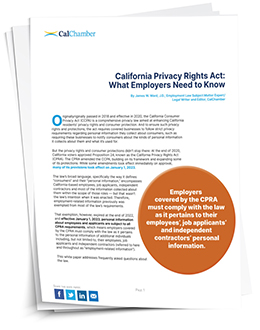
Originally passed in 2018 and effective in 2020, the California Consumer Privacy Act (CCPA) is a comprehensive privacy law aimed at enhancing California residents’ privacy rights and consumer protection. And to ensure such privacy rights and protections, the act requires covered businesses to follow strict privacy requirements regarding personal information they collect about consumers, such as requiring these businesses to notify consumers about the kinds of personal information it collects about them and what it’s used for.
But the privacy rights and consumer protections didn’t stop there: At the end of 2020, California voters approved Proposition 24, known as the California Privacy Rights Act (CPRA). The CPRA amended the CCPA, building on its framework and expanding some of its protections. While some amendments took effect immediately on approval, many of its provisions took effect on January 1, 2023.
The CPRA is broad enough to encompass employees, job applicants and contractors and the personal information collected from them. For covered businesses, this creates several privacy-related obligations, including:
Download CalChamber's free "California Privacy Rights Act: What Employers Need to Know" white paper for answers to the most frequently asked questions about the law..
Updated December 10, 2024

